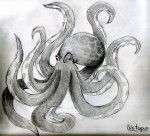My last post focused on the kinds of problems that can develop when abstract objects, created within mathematics, increase in complexity – like the difficulty of wrapping our heads around them, or of managing them without error. I thought it would be interesting to turn back around and take a look at how the seeds […]
|
|||||

Can the presence of intelligent behavior in other creatures (creatures that don’t have a nervous system comparable to ours) tell us something about what ideas are, or how thought fits into nature’s actions? It has always seemed to us humans that our ideas are one of the fruits of what we call our ‘intelligence.’ And […] A recent post on Mind Hacks challenged the perspective outlined in a NY Times op-ed by psychologist Gary Marcus with the title Face It, Your Brain Is a Computer. The title of Marcus’ piece may be misleading. The brain/computer analogy that he proposes is more a strategy than a theory. But the rejection of brain/computer […] The analysis of collective behavior is quickly becoming cross-disciplinary. I wrote a few years ago about a study that analyzed the coordination of starling flocks. That post was based on the work of Thierry Mora and William Bialek, presented in their paper Are Biological Systems Poised at Criticality. The paper was published in the Journal […] Studies and insights into the nature of consciousness always get my attention. Inevitably I see mathematics in the discussion, tangentially or directly (as with Giulio Tononi’s qualia space). I’d like to outline, here, a particular train of thought that emerged after reading a couple of articles and a few papers. The first of these, written […] I read a short article on scientificamerican.com reporting on a recent advance in the investigation of the neural systems that support navigation, or our sense of direction. When I did some follow-up on the individual who led the study, I was surprised to find another interesting collaboration between scientists and artists. While the collaboration was […] A short article in the April 16 issue of New Scientist reported on an applied soft computing paper that proposes an improvement on what’s known as ‘particle swarm optimization (PSO). Particle swarm optimization (PSO) is an optimization technique inspired by the social behavior of birds. Described as a simple and powerful algorithm, it can be […] Paperback and electronic versions of John Horgan’s 1996 book, The End of Science, have recently been published by Basic Books. Horgan wrote a bit about how the text was received in 1996 on his weekly Scientific American blog. I read the book in 1996 and wrote to Horgan about the impact it had on me. […] A paper by Virginia Chaitin was recently brought to my attention. She is currently a Post-Doc at the Univeridade Federal do Rio de Janeiro, with research interests that include, among others, the history and philosophy of science, epistemology, and interdisciplinarity. The paper I just read, Metabiology, Interdisciplinarity and the Human Self-Image, focuses on the kind […] Today, I involved myself in a debate that hasn’t gotten very loud yet and, perhaps for that reason, I felt like I was going around in circles a bit. The questions I began trying to answer were sparked by a Mind Hacks post entitled Radical embodied cognition: an interview with Andrew Wilson. Wilson’s ideas challenge […] |
|||||
|
Copyright © 2025 Mathematics Rising - All Rights Reserved Powered by WordPress & Atahualpa |
|||||


Recent Comments